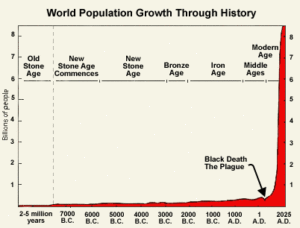
Whether you realise it or not, these are exciting times for Planet Earth. We are currently in the middle of what is known as the Sixth Extinction (in the history of Earth), or the Holocene Extinction, after the geological era. This has been caused by humans, and is reshaping the biosphere of the entire planet.
The Sixth Extinction began with human migration outside of Africa. The existing megafauna of other continents – like the Woolly Mammoth and the Moa – occupied niches that were highly sensitive to the introduction of a new apex predator, and almost all of them were wiped out by human expansion.
Today, the Sixth Extinction has wiped out significant numbers of species on every land mass and ocean. The current rate of species loss is believed to be 1,000 to 10,000 times higher than what it would have been without human presence.
And it’s not just because we’re particularly wasteful or greedy.
One inescapable fact of nature and reproduction is that, for your offspring to occupy a niche within nature, they have to drive out any possible competitors in that niche, and then to defend it against all comers. So for your offspring to so much as exist and continue to exist, they have to kill other life, because nature is permanently in a state of flux and this means conflict.
Your offspring have to eat. There’s no way around that. The cattle sector of agriculture has been responsible for 80% of the rainforest destruction since 1970. And one estimate of the world’s fish stocks suggest that the number of fish in the oceans are now 10% of their pre-industrial value.
Even if you raise them to be vegans (which is itself morally questionable), the food still has to be grown somewhere and your offspring have to live somewhere, and much of the remainder of Amazon rainforest destruction is for soybean production, housing space, or for hardwoods.
This rate of destruction is not inevitable. In fact, it is a function of another variable: our rate of population increase.
Given the increase in the human population in recent centuries (as depicted in the graph above), it is simply unavoidable that we would do the amount of ecological damage that we have done. Because people have to consume the environment around them in order to continue to live, an increasing population will always alter its environment – and therefore contribute to species extinction – in so far as it needs to eat.
The central contention of this essay is this: anyone who has more than two children does an amount of environmental damage to nature which, in terms of degree of tragedy, is equal to committing murder.
After all, there is one thing we do know for certain about our increasing population, and that is the higher it increases, the higher the demand for the limited resources of the planet become, and therefore the closer we move towards war.
If a couple has two children to replace themselves they are not increasing the amount of pressure on the environment. Only by having three or more does a couple ensure that their offspring have to expand into other niches instead of (relatively) simply just inheriting those of their parents. This expansion means aggression against the previous inhabitants of those niches – and this is unavoidable.
Perhaps, if humans were serious about avoiding the environmental collapse that would kill us all, we would pass a law so that any man who could be proven to have three or more children is to be executed. If three children was considered too restrictive, we could start with a boundary of four or even five.

The idea that the first two offspring we create have no environmental impact is a convenient untruth. When a couple co-creates a new human with a lifetime of doing what we do, they increase their impact by at least 50%. Two will generate a 100% increase, assuming their lifestyle is no more destructive than their parents and they don’t create more themselves.
As long as we continue to cause extinctions at 100 times the background rate, and tens of thousands of existing children die of preventable causes each day, the intentional creation of one more of us by anyone anywhere can’t be justified.